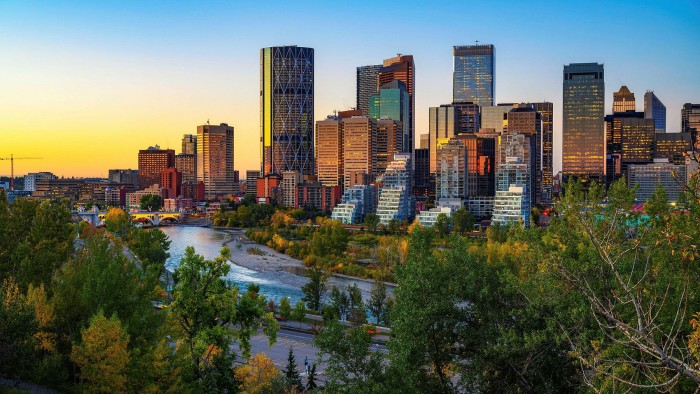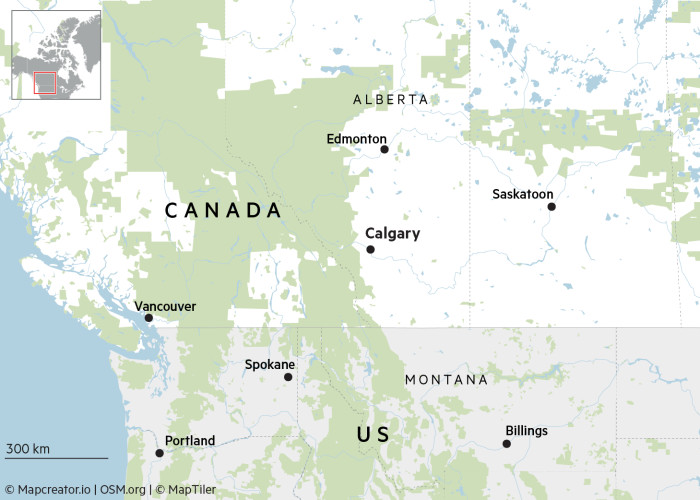Calgary start-ups show energy is not the only game in town

Simply sign up to the US & Canadian companies myFT Digest -- delivered directly to your inbox.
Drive towards downtown Calgary from its impressive international airport and the foundations of the local economy are clear. “Be part of the energy,” says the city’s official welcome sign. “We love oil and gas,” screams a billboard.
But an over-reliance on oil has its downsides. In 2014, the price crashed. Investors shunned Canada’s grubby oil, while environmentalists laid siege to it, blocking pipeline projects in court. Calgary’s skyscrapers, erected during the oil boom, have North America’s highest commercial vacancy rate, at almost 30 per cent.
Now, though, new types of business are taking a chance on Alberta’s biggest city, drawn by low rents, low taxes and a strong talent pool. Some are among the fastest-growing companies in North America.
“Pretty much anybody can start a company if you have a good idea, if you work hard, if you’re intelligent, if you can create a team — the world is your oyster in Calgary,” says James Lochrie, managing partner of Thin Air Labs, an investment firm based in the city.
However, Calgary’s entrepreneurs have long complained that investors are too focused on energy and real estate. In 2019, the oil-mad provincial government of Jason Kenney actually removed incentives to invest in small businesses, including a 30 cents in the dollar tax credit. A year later, the province’s Innovation Capital Working Group warned that “Alberta is at risk of being left behind”.

But Kenney’s government has upped its game in the past 18 months — funding accelerators, meeting tech companies and giving cash to the Alberta Enterprise Corporation, which funds venture capital firms. Many feel that Calgary is now, finally, reawakening.
“We’re starting to see exponential growth of seed-stage investing happening here in the province,” says Lochrie. He expects as many as 100 Series A funding deals each year in three to five years’ time. Not too long ago, he had said the city would see just five deals in an average year.
This change is being felt in Calgary’s downtown, once the sole domain of the energy sector. The Sun Life Plaza building, constructed during the 1980s, has become as The Ampersand, a start-up hub. In hip East Village there is a business incubator called Platform Calgary.
According to CBRE, a real estate company, the number of tech workers in Calgary grew by 46,700 between 2015 and 2020. Tech firms now occupy 8 per cent of office space, which is cheaper than in Vancouver and Toronto. Visible from the city are the Rocky mountains, a draw for nature-loving tech workers. And WestJet, Canada’s second-largest airline, is based in Calgary.
“A growth-focused Canadian company always looks outside its own home market,” says Cody Slater, chief executive of Blackline Safety, which makes wearable safety technology and gas monitors. Five years ago, 60 per cent of Blackline’s business came from Canada; today it is just 20 per cent. The Calgary-based company — featured in the latest FT-Statista ranking of The Americas’ Fastest- Growing Companies — is growing at 40 per cent annually and has offices in France, the UK, US and UAE.
Recent data show that investment is climbing. According to briefed.in, which analyses Canada’s tech industry, annual investments in the city almost doubled to C$322mn between 2019 and 2021. Rapidly growing industries include fintech, heavy engineering, aerospace, carbon capture, sustainability and data — particularly artificial intelligence and machine learning.
Café equipment supplier Eight Ounce Coffee was set up in Calgary in 2011 by Wesley Farnell and his wife Jen — and it now has three warehouses and 40 employees.
“Calgary has this image of being, and rightly so, a very oil-driven boom-and-bust town,” he says. “We also have a lot of amazing companies here. Those people and those businesses should be the ones pushing the agenda.” Eight Ounce achieved a 2017-20 compound annual growth rate of 26 per cent.
Executives, entrepreneurs and economists now worry that high oil prices and the war in Ukraine — which has spurred calls for Canadian oil and gas to fill European shortfalls — could slow Alberta’s transition to a more diversified economy.
Trevor Tombe, an economics professor at the University of Calgary, says he shows new students a graph that plots mentions of the word “diversification” in the Calgary Herald newspaper against the price of oil. When the oil price is high, he says, the graph shows that discussion of diversification falls.
But Lochrie says an enormous amount of Calgary-based intellectual property is helping the city. “The level of IP, hard science that is now coming into commercialisation is pretty special,” he argues. Meanwhile, successful entrepreneurs have created charitable foundations that provide money to research institutes.
With higher salaries and lower rents than other major Canadian cities, locals also make good target customers for companies such as DJ Bikes. The electric-bike manufacturer, one of North America’s fastest-growing companies, this year opened its first bricks-and-mortar store in Calgary after finding success online.
“We focused on internationalisation for the first few years, and now we are focused on localisation,” says founder Daniel Yang. “I see a bright future for this city.”
Comments